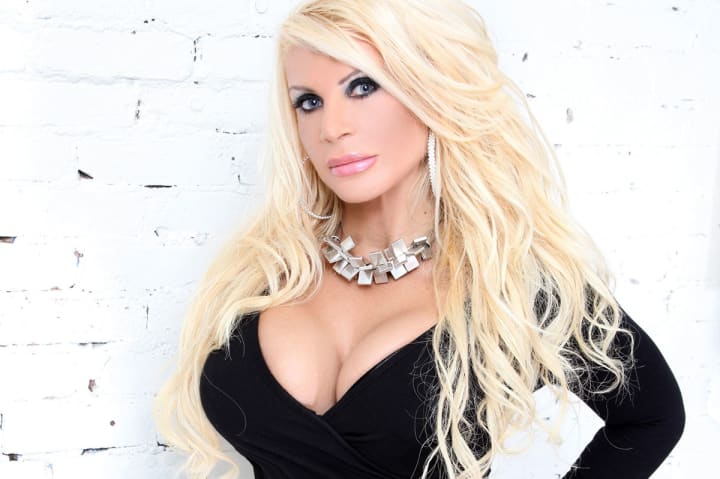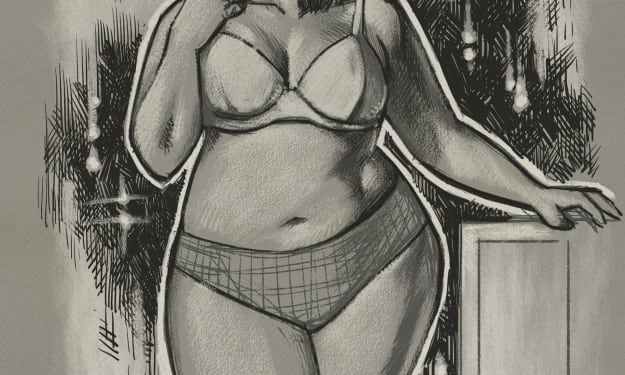Manhattan Madam Exclusive Interview
Just released from prison, Kristin M. Davis, known as the Manhattan Madam, combats the injustices and mistreatments behind the very bars she was confined in.

Coined the salacious moniker of "The Manhattan Madam" from hungry press and angry politicians, Kristin M. Davis has found herself in the crossfires of media ever since she made her first headline. As a "Madam," "Politician," "Hedge Fund VP," "Prisoner," and "Advocate," Kristin Davis has lead a colorful life filled with ups, downs, and everything that makes the greatest material for a female empowered memoir. Passionate, fiercely independent, and true to her laurels, Kristin now finds herself out of prison and into the next phase in life: one of advocacy.
On January 2, 2015 Kristin self-surrendered to the Federal Prison Camp in Victorville, CA to serve a 24-month sentence for selling prescription drugs. Years previous to her final incarceration, she spent four months in solitary confinement in the harrowing Rikers Island. During these life-altering experiences, Kristin Davis found outrage, horror, and empathy for the atrocities occurring behind closed bars and far from the public's eye and radar. Upon release, Kristin founded The Prison Advocate, an advocacy and consulting company aimed at combatting each and every injustice behind bars. From rape to abuse and mistreatment, Kristin Davis is helping others during a time when neither she––nor her fellow inmates––were helped.

Photo courtesy of Kristin Davis
What was the first piece of food you ate after your release from prison? I can’t even imagine how good it must have tasted.
When I was released from federal prison I was given a short furlough to fly from California (where I did my time) to a halfway house in the Bronx where I would serve the remainder of my sentence—six months—in “community custody.” I was supposed to have two hours with my family at the airport to say goodbye and eat. However, the prison released me two and a half hours late and I barely made my flight. So, technically, my first post prison food was McDonalds at SFO airport (laughs). But some hot fries and a Diet Coke tasted delicious after a year of eating prison food.
During your 24 months of incarceration, what pushed you through or acted as your “light at the end of the tunnel?” How did that experience lead you towards a platform of advocacy for those behind bars?
I went into prison already planning for my release. Every moment I was in there I spent trying to better myself both physically and mentally. I was literally busy with prison programs from 6:30 AM to 9:00 PM Monday through Friday. Being busy helped keep my mind off of the degradation and awful things that happen behind bars. I have a good group of friends and an amazing mother who wrote me daily, sent me books, and emailed me (federal prison has an email system called corrlinks)—their love and support really helped. It’s easy to get depressed and feel forgotten in prison, so a good support system can really make a difference in getting you through.
While in prison I witnessed a lot of inhumane treatment. I thought that federal prison would be full of big time criminals... but I realized that most of the women were there for conspiracy charges because they knew about drug deals or maybe helped a boyfriend who was a drug dealer. These women received five to 10 year mandatory minimums. Quite a few of them had parents who sold drugs and were addicts themselves. Many of them were sexually molested. Their stories were heartbreaking.
Most of these women did not have a shot in life—they grew up abused with no one to teach them anything different. Then, we send these women to prison for excessive periods of time where there is no rehabilitation (there are no real job or education programs) so we are not helping them; We are merely housing them like cattle. Add to that an institution-wide mindset that treats these women inhumanely and further instills a sense of worthlessness. Getting to know these women and how they want to have better lives—yet don’t know how—made me want to get involved. No one deserves to be treated like they are throw-away people.
To illustrate what I am talking about, let me give you a few examples: In federal prison they do not fill cavities—it is cheaper to pull your tooth than to fill the cavity. So if you have a tooth problem during your sentence, you will end up without that tooth. I’ve seen numerous women get their FRONT teeth pulled. Can you imagine how heartbreaking it is to look in the mirror and not have a front tooth? Can you imagine trying to get a job and rebuild your life without your front teeth? I saw numerous women denied medical care. If you get sick in prison, you go to sick call. It is common practice for them to think you are making up your illness and tell you to buy Tylenol off commissary (they don’t even give you this and many cannot afford to buy it). You might have to go to sick call for six months to a year before they start taking you seriously and actually send you to a doctor offsite. I knew one woman who had stage four cancer who had been denied medical care for two years despite dozens of trips to sick call. She was waiting for her compassionate release so that she could go home to die.

Photo via The SunInternational Business Times
Over two years later, how have your experiences at Rikers Island impacted your advocacy about females in prison?
Riker’s Island is a state facility, which is much different than a federal prison. No prison is a good experience, but Riker’s Island is hell on earth. I spent close to four months in solitary there and I was often left in my cell with no water and not fed. I have talked about this for eight years now... and people are still dying in solitary. Since my time there, two people have died and numerous officers have been caught for bringing in contraband or being corrupt. But Riker’s Island still stands. If anything, my experience there taught me to fight back against the system.
At any point, did you feel remorse for your life-before-bars?
That is a tough question. Remorse would mean that I equate those experiences in a negative light—as if those experiences were wrong. I don’t feel remorse, because I look at those experiences as having made me a better person. I learned a lot about myself and how the world works through those events. I learned how to appreciate the people in my life and how precious they are—how precious each moment is.
I can say I regret hurting my family, friends, and those who believed in me. I regret that 100 percent. I feel remorse that my actions could have caused anyone pain. But I cannot change that—I can only try to not make the same mistakes and hope that I do the right thing with this second shot in my life.
Given the current political hoopla created from the 2016 election, would you ever consider running for office again? What initially drove you to be politically involved in the US?
I initially became interested in politics because I wanted to lobby for decriminalization of prostitution, when I discovered that a girl who used to work for me, Julissa Brisman, was murdered by Phillip Markoff—aka The Craigslist Killer. I met Roger Stone, my political advisor, on a radio show and asked him how to do this. He thought running for office would be a way to highlight this issue—as well as other Libertarian issues I care about—and a way to protest against the corrupt NY political system.
As a federal felon, I am unable to run for federal office since I no longer have federal voting rights. I did get my state voting rights back, which means I can run for a NY State Office which I may consider in the future... if Roger Stone agrees to run my campaign...

Photo via International Business Times
You mention in the xoJane article that you started working full-time at just the age of fifteen. How did that impact your work ethic throughout your life? Would you want your child to start working at that age?
I graduated from high school at the age of fifteen and went to work full-time right after. There was no money for college and I really didn’t want to burden my mother with supporting me since she worked hard her entire life to provide for me. She taught me my work ethic and, ever since I can remember, she worked 50-70 hours a week trying to provide. I spent many nights after school or on the weekends at her job helping her. In fact, she took away my allowance (and lunch money) when I was roughly twelve years old and put up a chore list. Each chore had a dollar amount associated with it, and if I wanted money for lunch or anything else, I had to work for it. Little did she know, I was a motivated child and did everything on the list and made twice as much! I do think that work ethic is part of what helped me after prison; I'm not afraid to work hard to put my life back on track.
I definitely want my child to understand the value of hard work and to appreciate it. Although, I would like for him to be a kid a little bit longer than I was and maybe have the traditional college experience that I didn’t have (I worked full-time, two jobs, while I was in college).
Do you believe that the escort industry is still as profitable after all of the scandals that have been associated with it?
The short answer is, yes. Scandals are not a long-term deterrent—they only deter people for a short time until a false sense of security sets in and they go back to their normal behavior. I do think it is a bit less profitable because of all of the sugar baby sites and alternatives—and shady business people running agencies now.
Are you in contact with the girls and clients of your “old life”?
I am in contact with a few of the women who used to work for me. No clients—they fled like rats fleeing a sinking ship.
Do you still believe marijuana and prostitution should be legalized? Can we prevent the abuse of these two things?
I am a Libertarian, so I believe in personal choice and personal freedom, which would mean legalization of both marijuana and prostitution. We cannot prevent abuse—legal or illegal. People are smoking pot and using escorts and we can’t stop it now even though it is against the law.
I do not believe the government should be in anyone’s bedroom. However, when it comes to prostitution, I favor decriminalization over full blown legalization. That’s primarily because I don’t think anyone (not a pimp, madam, or the government) should tell a women what to do with their body. Decriminalization would allow women to work for themselves and have the right to call the police if they are victimized.
What advice do you have for young women involved in the escort industry and young women behind bars?
My advice to women working in the sex industry is to be safe. Screen your clients thoroughly and turn them down if they don’t meet your safety criteria. Your life is not worth the risk for a few hundred dollars. Also, have an exit strategy. You can’t work in the business forever, so define your plan and stick to it.
As for any women behind bars… just to know that life is still valuable. There is life after prison. And there are people who want to help. They can contact me and I will guide them in the right direction.

Photo via NY Post
When things are all said and done, do you want your legacy to be known as Manhattan Madam, Kristin M. Davis, or is your legacy still unwritten?
I have tried for years to get away from the Manhattan Madam moniker. That was given to me by the media while I was in Rikers. I do not think my legacy is tied to being a madam since I have done so much more than that. That is just what sells newspapers and gets people to tune-in to TV shows since we are fascinated by sex and who is doing what behind closed doors. If my legacy starts with that, and people see that you can fall down and get up and change and keep on changing… and fighting, that would be great.
You mention at the end of your letter that you believe you got what you deserved, and that while you squandered your last chance, you surely will not squander your next. How has this experience affected the way you act and the way you perceive life? Even for the life of your child?
I do believe I got what I deserved. After seeing many of the women in federal prison, and how they didn’t grow up with a chance in life and I did, and I didn’t appreciate it, I think I needed to go to prison to fully understand that.
The way I perceive life is very different. I lived in a small cell with two other women. I had a small locker 3' x 3' that contained everything I owned. I can get by with very little now, and am appreciative for all I have and those that stood by me. I’m even appreciative for those that didn’t stand by me because that was a lesson in itself.
I hope my child appreciates people the way that I do and stands up and fights for them, because it’s the right thing to do.
Kristin Davis, the famous "Manhattan Madam," reveals the seduction and sexual techniques that her clients paid thousands of dollars an hour for and that garnered her the largest and flashiest client list in the industry in this tell-all guide.
About the Creator
Natasha Sydor
brand strategy @ prime video






Comments
There are no comments for this story
Be the first to respond and start the conversation.